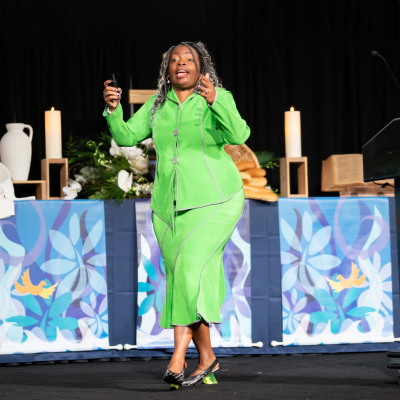Bishop Moore-Koikoi reflects on trauma and joy
By Alison Burdett
 Bishop Cynthia Moore-Koikoi, daughter of the Baltimore-Washington Conference, led Wednesday morning’s Bible study helping members to understand “trauma-informed joy.”
Bishop Cynthia Moore-Koikoi, daughter of the Baltimore-Washington Conference, led Wednesday morning’s Bible study helping members to understand “trauma-informed joy.”
Following the Annual Conference’s guiding scripture, Philippians 4:4-9, she began explaining that Paul probably wrote these words while jailed in Rome and while some think this was one letter, some think it could have been just a bunch of ideas that Paul threw together over as many as three letters. Bishop Moore-Koikoi begs that those in conflict over how the words were written “give Paul a break,” she said. “He was in prison. He had some trauma going on.”
Bishop Moore-Koikoi, who serves the Greater New Jersey and Eastern Pennsylvania Annual Conferences, illustrated how Philippians 4 “lays out a scaffolding for how we stand firm in the Lord.”
Stand firm in the Lord in this way, the bishop said about Paul’s writings: work together; help each other; rejoice; be gentle; pray; think on good things; follow and be a good model.
She elaborated on Paul’s admonition to work together and to help each other. “There has to be a sense of unity in the community,” she said. “We are all responsible for doing the work of keeping the body together.”
Moore-Koikoi explained that trauma-informed joy is recognizing that we bring our woundedness and brokenness in our joy. One way to become trauma-informed is to avoid toxic positivity. Moore-Koikoi shared that 40-70% of the Psalms are lament Psalms, yet, only 5% of top 100 Christian worship songs are lament songs. “I can guarantee you more than 5% of Christians are experiencing trauma today,” she said.
Bishop Moore-Koikoi offered lessons from the Black Church tradition.
“It is my prayer, even as our churches become less segregated, that we hold onto the best part of the black church tradition that it becomes part of the new church tradition,” she said.
One of the things is that the black church tradition knows how to do lament, she said. “We know how to do some moaning and groaning and complaining to God.” This lament, she said, helps to lead to authentic joy. “You can’t dwell in joy except that you have walked through the valley of the shadow of death.”
Bishop Moore-Koikoi went on to share a story of her own personal trauma of the death of her brother, identifying that where and how he died was in Baltimore’s Inner Harbor very near the hotel. She confessed that as she drove past the location, she began to dwell on the last moments of his life, reliving and reimagining that trauma.
“And I didn’t want to bring that trauma into this space, where you were going to be talking about joy!” she said.
God revealed to her, she said, that God did not want her to forget about the trauma, but to dwell on that truth that “I am with you. I was with your brother, even when he took his last breath. I was there. And he’s with me now.”
Bishop Moore-Koikoi was then able to dwell on the “excellent parts” of this experience. She mentioned, for example, those who were involved in his life and who had offered him grace in his turmoil; those who helped after he died; and those who sent her cards after his death.
“And so, these are the things that I choose to dwell on,” she said. “To ponder the goodness of those who encountered my brother. So that I can say before you now, what I have brought before this room is not my trauma, but my joy.”
Moore-Koikoi will continue her study Thursday morning.
